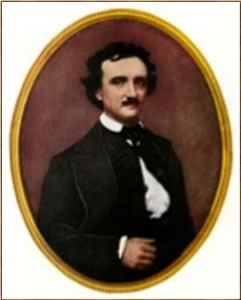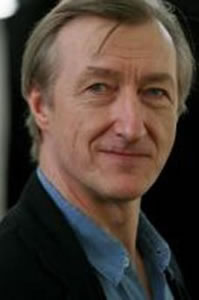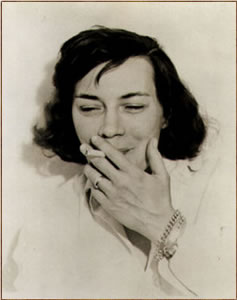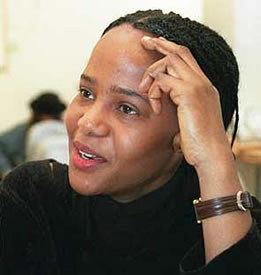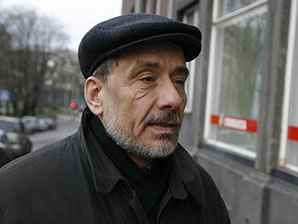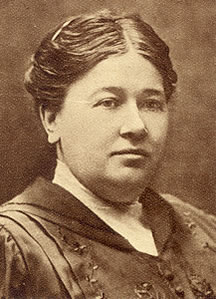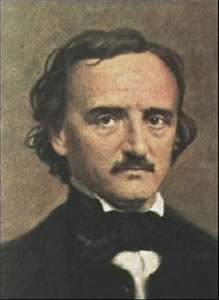De Amerikaanse schrijver Edgar Allen Poe werd geboren op 19 januari 1809 in Boston. Zie ook mijn blog van 19 januari 2007 en ook mijn blog van 19 januari 2008 en ook mijn blog van 19 januari 2009.
Uit: The Oval Portrait Analysis
„Long- long I read- and devoutly, devotedly I gazed. Rapidly and gloriously the hours flew by and the deep midnight came. The position of the candelabrum displeased me, and outreaching my hand with difficulty, rather than disturb my slumbering valet, I placed it so as to throw its rays more fully upon the book.
But the action produced an effect altogether unanticipated. The rays of the numerous candles (for there were many) now fell within a niche of the room which had hitherto been thrown into deep shade by one of the bed-posts. I thus saw in vivid light a picture all unnoticed before. It was the portrait of a young girl just ripening into womanhood. I glanced at the painting hurriedly, and then closed my eyes. Why I did this was not at first apparent even to my own perception. But while my lids remained thus shut, I ran over in my mind my reason for so shutting them. It was an impulsive movement to gain time for thought- to make sure that my vision had not deceived me- to calm and subdue my fancy for a more sober and more certain gaze. In a very few moments I again looked fixedly at the painting.
That I now saw aright I could not and would not doubt; for the first flashing of the candles upon that canvas had seemed to dissipate the dreamy stupor which was stealing over my senses, and to startle me at once into waking life.
The portrait, I have already said, was that of a young girl. It was a mere head and shoulders, done in what is technically termed a vignette manner; much in the style of the favorite heads of Sully. The arms, the bosom, and even the ends of the radiant hair melted imperceptibly into the vague yet deep shadow which formed the back-ground of the whole. The frame was oval, richly gilded and filigreed in Moresque. As a thing of art nothing could be more admirable than the painting itself. But it could have been neither the execution of the work, nor the immortal beauty of the countenance, which had so suddenly and so vehemently moved me. Least of all, could it have been that my fancy, shaken from its half slumber, had mistaken the head for that of a living person. I saw at once that the peculiarities of the design, of the vignetting, and of the frame, must have instantly dispelled such idea- must have prevented even its momentary entertainment. Thinking earnestly upon these points, I remained, for an hour perhaps, half sitting, half reclining, with my vision riveted upon the portrait. At length, satisfied with the true secret of its effect, I fell back within the bed. I had found the spell of the picture in an absolute life-likeliness of expression, which, at first startling, finally confounded, subdued, and appalled me. With deep and reverent awe I replaced the candelabrum in its former position. The cause of my deep agitation being thus shut from view, I sought eagerly the volume which discussed the paintings and their histories. Turning to the number which designated the oval portrait, I there read the vague and quaint words which follow:
“She was a maiden of rarest beauty, and not more lovely than full of glee. And evil was the hour when she saw, and loved, and wedded the painter.”

Edgar Allen Poe (19 januari 1809 – 7 oktober 1849)
Portret door Eric Allshouse
De Engelse schrijver Julian Barnes werd geboren op 19 januari 1946 in Leicester. Zie ook mijn blog van 19 januari 2007 en ook mijn blog van 19 januari 2008 en ook mijn blog van 19 januari 2009.
Uit: East Wind
„The previous November, a row of wooden beach huts, their paintwork lifted and flaked by the hard east wind, had burned to the ground. The fire brigade came from twelve miles away, and had nothing to do by the time it arrived. “YOBS ON RAMPAGE,” the local paper decided, though no culprit was ever found. An architect from a more fashionable part of the coastline told the regional TV news that the huts had been part of the town’s social heritage and must be rebuilt. The council announced that it would consider all options, but since then had done nothing. Vernon had moved to the town only a few months before, and had no feelings about the beach huts. If anything, their disappearance improved the view from the Right Plaice, where he sometimes had lunch. From a window table, he now looked out across a strip of concrete to damp shingle, a bored sky, and a lifeless sea. That was the east coast: for months on end you got bits of bad weather and lots of no weather. This was fine by him: he’d moved here to have no weather in his life.
“You are done?”
He didn’t look up at the waitress. “All the way from the Urals,” he said, still gazing at the long, flat sea.
“Pardon?”
“Nothing between here and the Urals. That’s where the wind comes from. Nothing to stop it. Straight across all those countries.” Cold enough to freeze your knob off, he might have added in other circumstances.
“Oorals,” she repeated. As he caught the accent, he looked up at her. A broad face, streaked hair, chunky body, and not doing any waitressy number in hope of a bigger tip. Must be one of those Eastern Europeans who were all over the country nowadays. Building trade, pubs and restaurants, fruit picking. Came over here in vans and coaches, lived in rabbit warrens, made themselves a bit of money. Some stayed; some went home. Vernon didn’t mind one way or the other. That’s what he found more often than not these days: he didn’t mind one way or the other.“

Julian Barnes (Leicester, 19 januari 1946)
De Amerikaanse schrijfster Edwidge Danticat werd geboren in Port-au-Prince op Haïti op 19 januari 1969. Zie ook mijn blog van 19 januari 2009.
Uit: Brother, I’m Dying
„On Sunday, October 24, 2004, nearly two months after he left New York, Uncle Joseph woke up to the clatter of gunfire. There were blasts from pistols, handguns, automatic weapons, whose thundering rounds sounded like rockets. It was the third of such military operations in Bel Air in as many weeks, but never had the firing sounded so close or so loud. Looking over at the windup alarm clock on his bedside table, he was startled by the time, for it seemed somewhat lighter outside than it should have been at four thirty on a Sunday morning.
During the odd minutes it took to reposition and reload weapons, you could hear rocks and bottles crashing on nearby roofs. Taking advantage of the brief reprieve, he slipped out o
f bed and tiptoed over to a peephole under the staircase outside his bedroom. Parked in front of the church gates was an armored personnel carrier, a tank with mounted submachine guns on top. The tank had the familiar circular blue and white insignia of the United Nations peacekeepers and the letters UN painted on its side. Looking over the trashstrewn alleys that framed the building, he thought for the first time since he’d lost Tante Denise that he was glad she was dead. She would have never survived the gun blasts that had rattled him out of his sleep. Like Marie Micheline, she too might have been frightened to death.
He heard some muffled voices coming from the living room below, so he grabbed his voice box and tiptoed down the stairs. In the living room, he found Josiane and his grandchildren: Maxime, Nozial, Denise, Gabrielle and the youngest, who was also named Joseph, after him. Léone, who was visiting from Léogâne, was also there, along with her brothers, Bosi and George.”
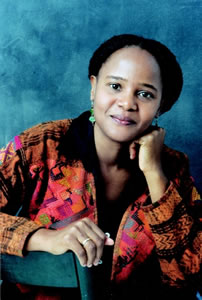
Edwidge Danticat (Port-au-Prince, 19 januari 1969)
De Oostenrijkse schrijver Gustav Meyrink werd op 19 januari 1868 te Wenen geboren. Zie ook mijn blog van 19 januari 2009.
Uit: Walpurgisnacht
„Ein Hund schlug an.
Einmal. Ein zweitesmal.
Dann lautlose Stille, als ob das Tier in die Nacht hinein horche, was geschehen werde.
»Mir scheint, der Brock hat gebellt«, sagte der alte Baron Konstantin Elsenwanger, »wahrscheinlich kommt der Herr Hofrat.«
»Das ist doch, meiner Seel’, kein Grund nicht zum Bellen «, warf die Gräfin Zahradka, eine Greisin mit schneeweißen Ringellocken, scharfer Adlernase und buschigen Brauen über den großen, schwarzen, irrblickenden Augen, streng hin, als ärgere sie sich über eine solche Ungebührlichkeit, und mischte einen Stoß Whistkarten noch schneller, als sie es ohnehin bereits eine halbe Stunde hindurch getan
hatte.
»Was macht er eigentlich so den ganzen, lieben Tag lang?« fragte der Kaiserliche Leibarzt Taddäus Flugbeil, der mit seinem klugen, glattrasierten, faltigen Gesicht über dem altmodischen Spitzenjabot wie ein schemengleicher Ahnherr der Gräfin gegenüber in einem Ohrenstuhl kauerte, die unendlich
langen, dürren Beine affenhaft fast bis zum Kinn emporgezogen.
Den »Pinguin« nannten ihn die Studenten auf dem Hradschin und lachten immer hinter ihm drein, wenn er Schlag 12 Uhr mittags vor dem Schloßhof in eine geschlossene Droschke stieg, deren Dach erst umständlich auf- und wieder zugeklappt werden mußte, bevor seine fast 2 Meter hohe Gestalt
darin Platz gefunden hatte. – Genau so kompliziert war der Vorgang des Aussteigens, wenn der Wagen sodann einige hundert Schritt weiter vor dem Gasthaus »Zum Schnell« halt machte, wo der Herr Kaiserliche Leibarzt mit ruckweisen vogelhaften Bewegungen ein Gabelfrühstück aufzupicken
pflegte. – –
»Wen meinst du«, fragte der Baron Elsenwanger zurück, – »den Brock oder den Herrn Hofrat?«
»Den Herrn Hofrat natürlich. Was macht er so den ganzen Tag?«
»No. Er spielt sich halt mit den Kindern in den Choteks- Anlagen.«
»Mit ›die‹ Kinder«, verbesserte der Pinguin.
»Er – spielt – sich – mit – denen – Kindern«, fiel die Gräfin verweisend ein und betonte jedes Wort mit Nachdruck. Die beiden alten Herrn schwiegen beschämt.“

Gustav Meyrink (19 januari 1868 – 4 december 1932)
De Portugese dichter Eugénio de Andrade (eig. José Fontinhas) werd geboren op 19 januari 1923 in Póvoa de Atalaia. Zie ook mijn blog van 19 januari 2009.
Silence
When tenderness
seems tired at last of its offices
and sleep, that most uncertain vessel,
still delays,
when blue bursts from
your eyes
and searches
mine for steady seamanship,
then it is I speak to you of words
desolate, derelict,
transfixed by silence.
Fruit
Peaches, pears, oranges,
strawberries, cherries, figs,
apples, melon, honey dew,
oh, music of my senses,
pure pleasure of the tongue;
let me speak now
of fruit that fascinate,
with the flavour, with the hues,
with the fragrance of their syllables:
oh tangerine, oh tangerine.
Vertaald door Alexis Levitin

Eugénio de Andrade (19 januari 1923 – 13 juni 2005)
Zie voor nog meer schrijvers van de 19e januari ook mijn vorige blog van vandaag.

